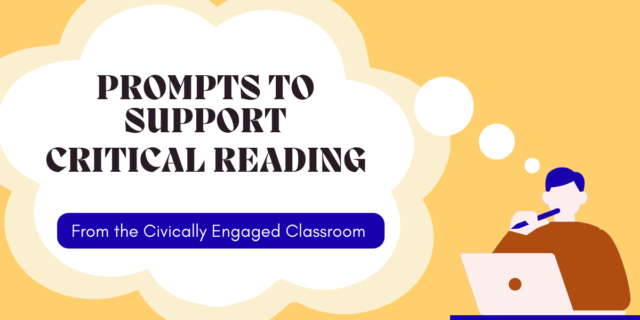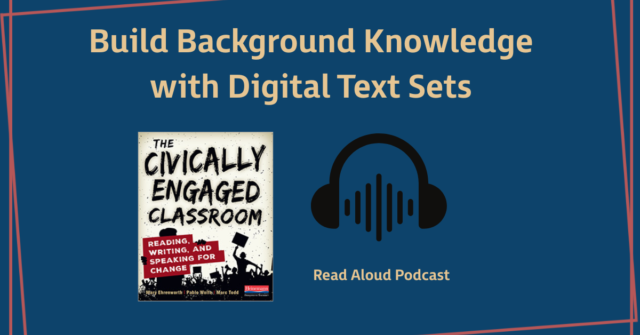
Adapted from the introduction of The Civically Engaged Classroom: Reading, Writing, and Speaking for Change by Mary Ehrenworth, Pablo Wolfe, and Marc Todd.
Adapted from the introduction of The Civically Engaged Classroom: Reading, Writing, and Speaking for Change by Mary Ehrenworth, Pablo Wolfe, and Marc Todd.
The Challenges Facing Our Democracy and Our Students
COVID-19 exposed every flaw and crack in our society, and education and protest have never mattered more. While rich and poor alike are susceptible to the virus, there is no question who has been dying at greater rates. While some of us sheltered in and continued to collect paychecks, many exposed themselves daily to the virus in order to maintain their income. As unemployment numbers balloon, many struggled with no income at all. Access to healthcare has been unequal and unfair, with BIPOC and immigrant families enduring racial injustice in our healthcare systems. Immigrants were detained at the United States-Mexico border in inhumane conditions that continued to spread the virus. As the country with the highest incarceration rate in the world, the United States saw the virus tear through its prisons. The litany of injustices revealed by the virus is long and sobering and it doesn’t take rigorous analysis to see that its consequences are felt in vastly different ways across racial fault lines. Faced with this oppressive reality, which is just one in a list of injustices that haunt the daily lives of so many citizens, our great fear is that our young people will retreat and disengage.
The antidote to creeping hopelessness is action. In our classrooms, whether virtual or brick-and-mortar, we must look collectively at the resistance movements, the moments of light and possibility when things changed for the better, when people spoke up, marched, wrote, formed coalitions, and voted—and take example from their investment in bettering our society. Our young people can’t vote yet, but they will. It’s not our job to tell them what party or candidates to vote for. It is our job to instill a sense of civic engagement. It’s our job to help them become citizens who seek knowledge from multiple sources, who are alert to bias, who are critical—and engaged—consumers and producers of media.
If our students are to become the citizens our society needs, we need to prepare them for this struggle—first, by raising their awareness of injustice, then by helping them develop the critical thinking skills to coherently critique our societal ills, and lastly, by helping them practice the civic virtues our future as a nation will depend on.
What We Can Do
For all the truly frightening oppression and bias that infuse the very air we breathe, let’s also look at the signs of transcendent possibility and power that make it possible to teach with hope. Picture fifteen-year-old Greta Thunberg going from her sit-in outside her school to talking to the entire United Nations about the climate crisis. Picture fifteen-year-old Xiuhtezcatl Martinez getting fracking banned in his county. Picture sixteen-year-old Mya Middleton and seventeen-year-old Emma Gonzalez each speaking to thousands of protestors at the March for Their Lives. Picture the many children who shared messages of hope and demonstrated fortitude during an international pandemic, and who joined Black Lives Matter protests in hopes of a better world.
We live in a time that shows us, perhaps more than any time prior, the remarkable possibility of youth. In the adult-created mayhem of civic strife, it is remarkable how many young people are taking up activism.
Yet even as young people become more politicized, teachers remain unsure about their own political status in the classroom. Because we want to be careful about proselytizing, we sometimes remain quiet about public figures and policies.We avoid classroom discussions of current events. The problem with that approach is that silence is not neutral. Silence props up existing power hierarchies and does nothing to protect vulnerable students.
It’s not okay for teachers to ignore that a president and his political and social allies have made young people more afraid. It’s not okay that it is increasingly dangerous for young people in this country to identify as immigrants, Muslims, BIPOC, or LGBTQIA+. So, part of our job, regardless of our political affiliation, needs to be that we make our classrooms and our schools places where we stand up to hate speech, and where we encourage students to bring and embrace their whole identity.
That means explicitly doing anti-bias work and identity exploration.
If part of our work is to support students’ identity construction, and their ability to express and celebrate all the parts of themselves, another part of our work is to teach in such a way that kids are educated for participatory democracy.
While our classrooms are not the only place where young people will learn how to interact with democratic society, they are an essential space for them to experience what it means to live in community with others, to balance their own interests with those of the group, to challenge themselves to overcome differences, and to ask the questions that help them understand the crux of an issue. These are civics lessons that must be lived in our schools today, and we need a committed corps of teachers to deliver them.
You are one of these badass teachers.
And to you, our fellow badass teachers, we have a similar exhortation. Under the current conditions facing our country, the teacher cannot sit idle; the teacher must be an active proponent of reason, logic, empathy, and passionate inquiry—none of which should be the exclusive province of a particular political party or ideology. You must get out there and teach. Teach!
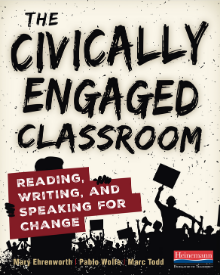
To Learn more about The Civically Engaged Classroom visit Heinemann.com.
🎧 Listen to our recent conversation with the authors. 🎧
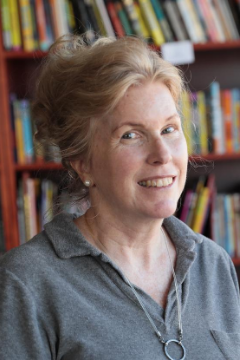
Mary Ehrenworth, Senior Deputy Director of the Teachers College Reading and Writing Project and co-editor for the Units of Study for Teaching Reading, Middle School series, works with schools and districts around the globe, and is a frequent keynote speaker at Project events and national and international conferences. Mary’s interest in critical literacies, deep interpretation, and reading and writing for social justice all inform the books she has authored or co-authored in the Reading and Writing Units of Study series as well as her many articles and other books on instruction and leadership. You can connect with her on Twitter @MaryEhrenworth.
Pablo Wolfe is a Washington DC-based educator who promotes civic education as a means to improve student engagement, celebrate student identity, and embolden the next generation of activists. He's been a public school administrator, a staff developer with the Teachers College Reading and Writing Project, a teacher, and a parent, and in all of these roles has sought to make school a training ground for civic life. Whether planning town hall meetings with groups of 7th graders, writing letters to elected officials, or organizing opportunities for service learning, Pablo believes that academic skills are best learned when applied towards addressing social injustices. He is currently working to create a network of civic-minded educators to share stories and best practices that illustrate how civic knowledge, values, and behaviors improve student outcomes and transform schools. A strong believer in the role of teachers as agents of social change, he strives to thread this idea through his writing, staff development and teaching.
Pablo is the founder of the Coalition of Civically Engaged Educators. If you are an educator and are interested in joining a community of practice dedicated to preparing the citizens this world needs right now, then the CCEE is for you! Visit Civically-engaged.org to learn more. You can connect with him on Twitter @pablowolfe.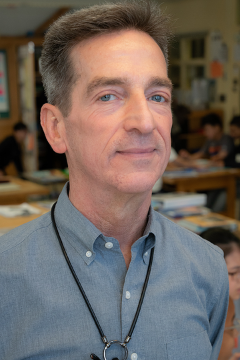
Marc Todd teaches Social Studies at IS 289, the Hudson River Middle School in New York, and is a national presenter for the Teachers College Reading and Writing Project. He collaborates with teachers around the world and leads workshops and institutes on culturally relevant pedagogy and teaching students to be critical readers of history. Marc believes in immersing kids in nonfiction reading and making notebook work inside of content classes both serious and joyful. He incorporates Paulo Freire's Pedagogy of the Oppressed and Augusto Boal's Theatre of the Oppressed into his curriculum. You can connect with him on Twitter @marctoddnyc.
